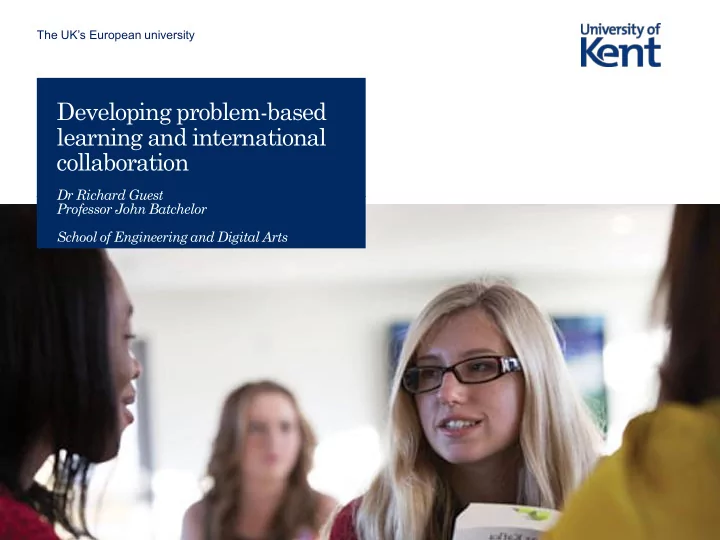

The UK’s European university Developing problem-based learning and international collaboration Dr Richard Guest Professor John Batchelor School of Engineering and Digital Arts
Engineering – Transferable Skills • Engineering has a (UK) image problem • Not a solitary task – communication is critical • Teamwork element to all engineering projects • Very often cross-cultural with an international focus • Engineering is problem solving with science • A need to instil professional design and decision making within the curriculum Page 2
EL311 – The Story of a Module • EDA teaches two streams of Engineering: • Computer Systems Engineering • Electronic and Communication Engineering • A key module in the first year is EL311 – the Robotics Project • Runs for two terms – practical hardware and software development, control, design and testing • Also teaches the basics of lab-based practical construction Page 3
EL311 – The Story of a Module • Students are required to design a line-following robotic vehicle that can automatically steer according to a printed track. • Pre-2015/16 - competition element whereby students raced their robot around a simple race track with competition marks given for speed and accuracy. • Marks were awarded throughout the project, on a report and on a final demonstration. Page 4
EL311 – Issues • Possible isolated development. • Variable rates of progress (often depending on background). • The need to maintain interest of all students. • ‘Tiredness’ of module – the need to revamp. • Extension of competition element – external competitions. Page 5
Internationalisation and Development • Summer 2014 - approach by Université Paris Ouest Nanterre La Défense (Paris X) to visit Canterbury. • Discussions around research and teaching. • Realisation that there was commonality between first year curriculum – both needed re-energising. • Faculty Internationalisation Fund allowed a visit to Paris in Autumn 2014 Page 6
The Redeveloped Module • Competition element – agreed format. • An agreed set of tracks and obstacles. • Common hardware and software platforms. • Entry of all teams from both institutions that have passed a minimum standard during construction. Page 7
The Redeveloped Module • The use of a blog to enable dialog and progress discussion between the two institutions. • A high profile video-linked competition day to be held at the end of the Spring term. • Possible exchange of students/winners for summer internships – ERASMUS+ Page 8
The Redeveloped Module • Collaboration between teaching and technical support teams to improve the student experience (and learning support) offered. • Curriculum rationalisation – extending the reach of able students without penalising those at the lower end. Page 9
Robotic Systems Development Page 10
Competition Day Page 11
Added Value • Motivation of students to make original contributions to specified robot systems in order to make them competition worthy. • The module remains applicable to the entire cohort requiring the Learning Outcomes and Key Skills associated with the implementation of a prescribed robot chassis driven by a control system. • 70% of the assessment marks are available for a perfect achievement of these requirements. Page 12
Added Value • The defined reward of additional contributions encourages not only expectations of further achievement in first years, but also by the introduction of responsive assessment periods earlier in Term 2 • Students are steered from regarding hard deadline dates as expected delivery dates. • The early delivery of primary parts enables the projects to be further improved. Page 13
Thoughts and Observations • Students thrive on the competition element • Additional studies are not seen as coursework • French students are keener to interact with UK students • Independence of study highlighted early on • The importance of deadlines • Team-based and international! • Future initiatives include wider international competitions (joint entries) and teaching initiatives. Page 14
THE UK’S EUROPEAN UNIVERSITY www.kent.ac.uk
Recommend
More recommend